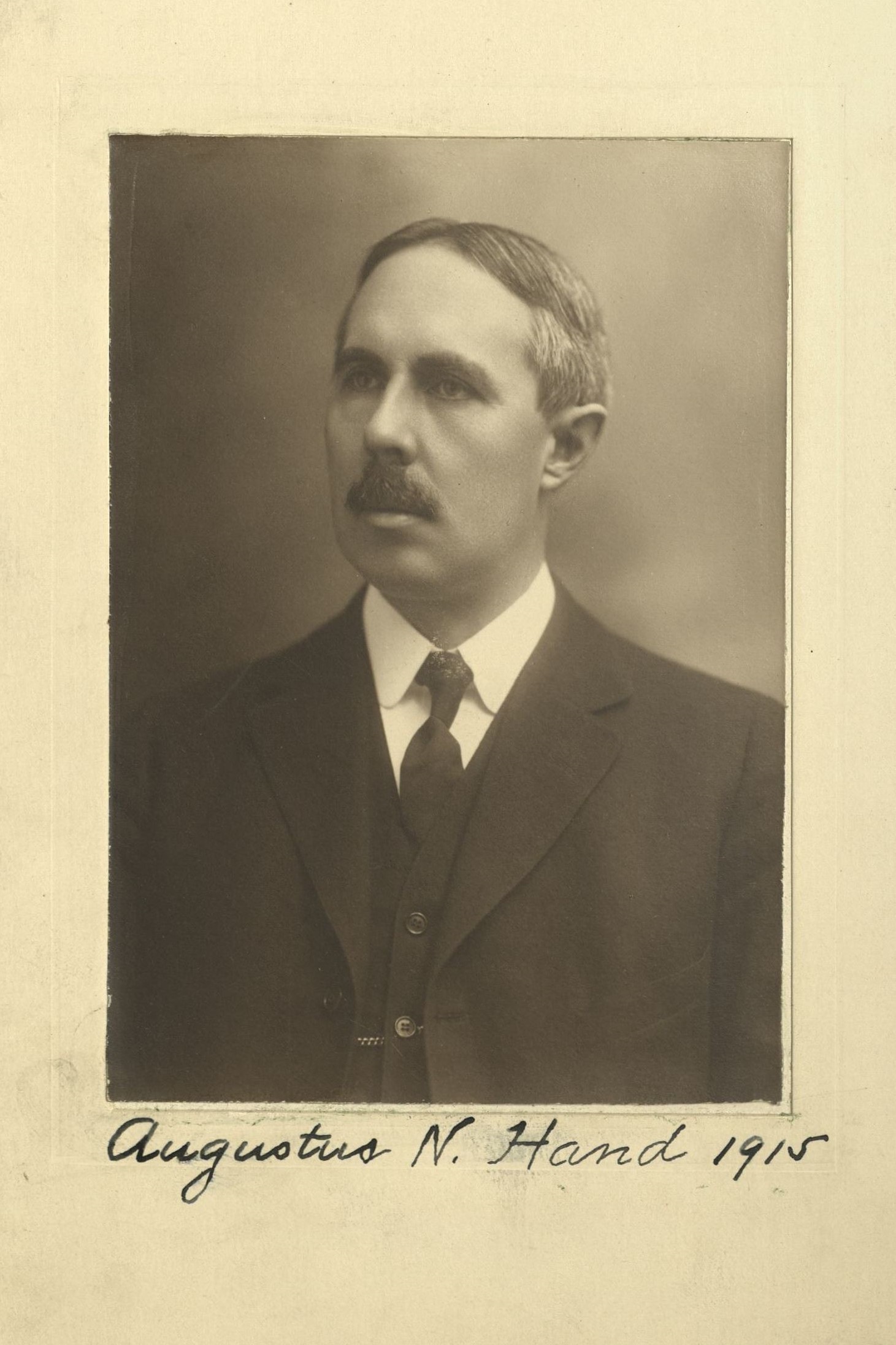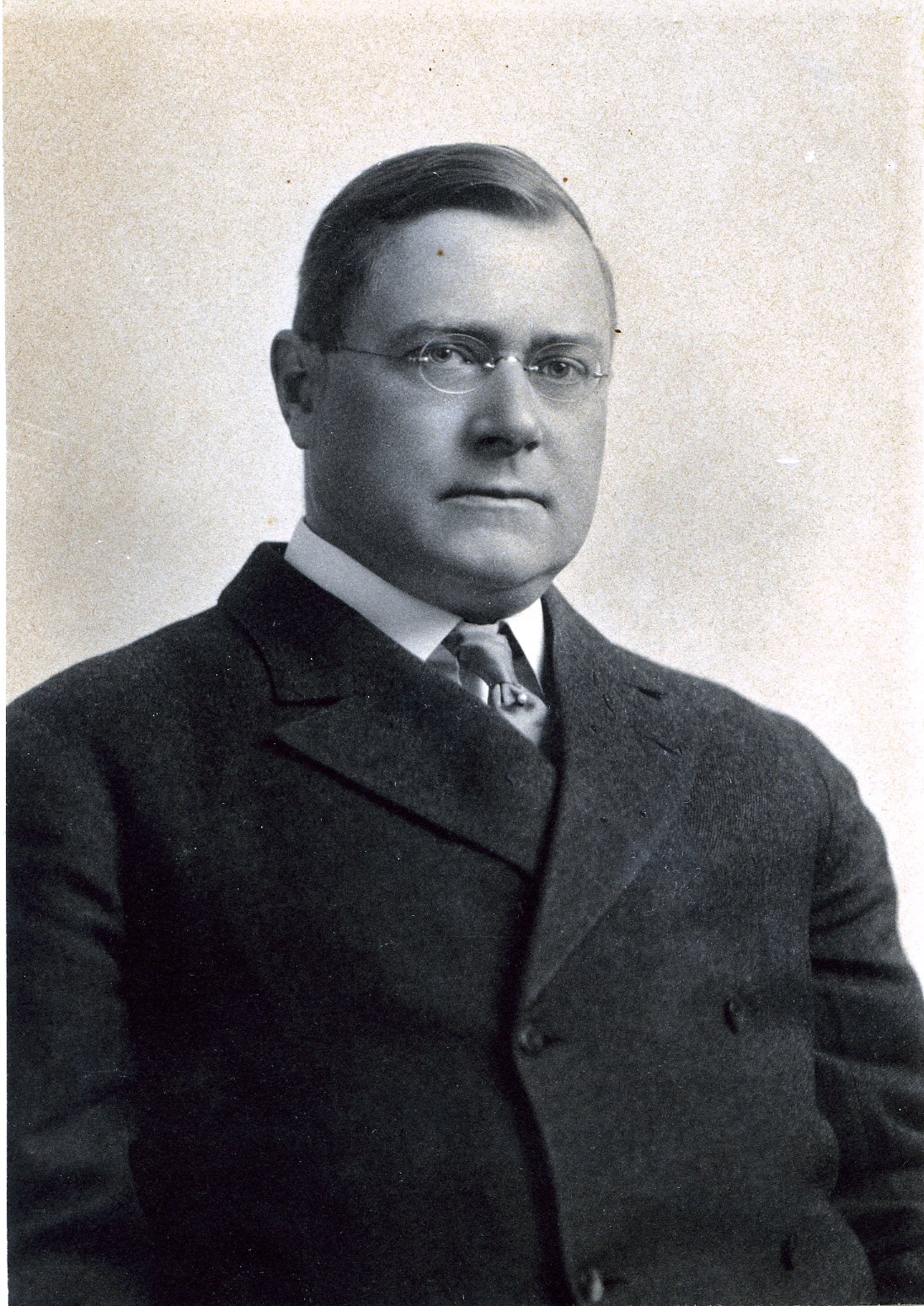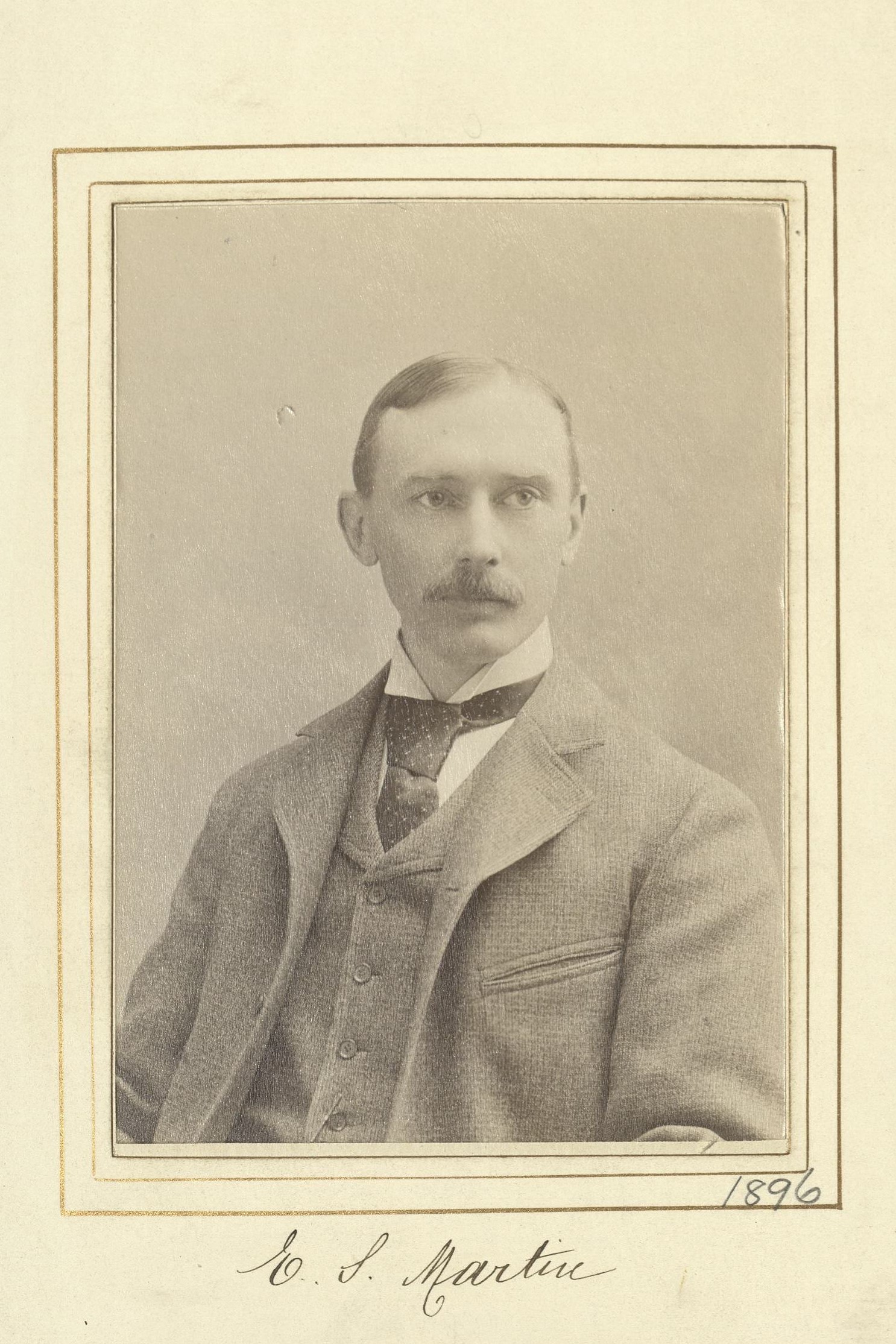Member Directory,
1847 - 1922
Learned Hand
Lawyer/Jurist
Centurion, 1908–1961
Charles C. Burlingham and Edward S. Martin
Albany, New York
New York (Manhattan), New York
Age thirty-six
Menands, New York

Archivist’s Notes
Second vice president of the Century Association, 1951–1952; designated an honorary member in 1959. Cousin of Augustus N. Hand; nephew of Richard L. Hand; father-in-law of Norris Darrell; grandfather of Jonathan H. Churchill.
Century Memorial
His friends called him “B”; some, perhaps, not knowing why. But it was all that had stuck from a first name—Billings—given him at baptism and which, without regret, he had dropped. Yet he didn’t mind the “B” for he was friendly and knew it was a vehicle of affection, and the august “Learned” might have been a roadblock on the path between love and greatness. He had modest thoughts about the podium on which he stood: to be a judge was not to judge, it was to interpret; to tell men why when they encountered the law. He worked less by codes than by intuition; nothing was ever more characteristic of his thought than his most celebrated utterance: “The spirit of liberty is the spirit which is not too sure that it is right.”
To Centurions who knew him well, B Hand had become something quite apart from the bench; easy to talk to because you knew he was listening, that he was accepting you always on his level. His response might be quite unexpected; sometimes it was ferocious in disapproval but always more pro vocative than frightening. “Why? Why?” he would insist, and suddenly you were thinking of reasons that had never occurred to you, and it was no matter whether you were talking about ancient Greece, Shakespeare, or rare roast beef.
A few Centurions had the good luck to be present at an argument between Judge Hand and Lawyer George Martin. George (whom B called “Brigadier”) was unused to defeat on forensic occasions; his rebuttals were quick, witty, sometimes outrageous, but he met his match with the Judge. The thing was gladiatorial; it was on a plane which, perhaps, is never reached except in the Century. If the conflict was about a court decision, an election, a president, a statute, a book, or a technicality of poker, the scene became equally thrilling to the audience.
These are happy memories—there were many others—and B loved the place where such things could happen. In all our history, no member has ever been elected to honorary membership with more acclaim.
“It is in a spirit of humility,” read the citation, “that we have welcomed him here whenever he has found the time, in his immeasurably useful life, to come within these doors. Yet his own modesty has matched, if that be possible, his great achievements. He has put us at our ease with his humor and geniality even though, perhaps unrealized by him, he has left us wiser with each visit. He has honored this association with his presence. Now we honor ourselves by honoring him.”
We remember, too, his address to the new members when he himself had been a member for fifty years. His address made no sense, and it was magnificent. It was wholly Centurion. Here was a man who had been called one of the greatest judges our country has produced, relaxing into the most charming nonsense with a Yankee folksong for a climax.
The Century, he said, was the best club. He wouldn’t tell why any more than Socrates would tell why his club was the best. They exiled Socrates and did him to death because he would not tell why.
“I think,” said B, “it’s a good club and it’s a damned good club. Don’t question me about it. If you do I will say ‘Let’s have some cocktails.’ And then I will send out to the barkeeper and say, ‘Slip this lad an iced hemlock.’”
A Centurion lawyer has called Judge Hand an “architect of the law.” In some two thousand opinions he has built many enduring structures. Many, too, have something akin to the aesthetic quality in art. They are simple, economical and direct in words. They appeal to the reason that is beneath all reasons; they penetrate argument through to common-sense faith. One is startled, sometimes, by the sudden poetry in them.
Hand’s independence has defied all efforts to label him, to imprison him in a category. Some, for instance, who called him a “liberal” because he decided against the suppression of the communistic New Masses and because of his opinion that James Joyce’s Ulysses was not obscene, were confounded when he upheld the conviction of certain Communist leaders under the Smith Act. Yet lawyers of all stripes have been put to it when they have tried to find either dialectic or moral flaws in his findings. Again, he was emphatic about witch hunts for Red infiltrators:
“Risk for risk,” he said, “for myself, I had rather take my chance that some traitors will escape detection than spread abroad a spirit of general suspicion and distrust, which accepts rumors and gossip in place of undismayed and unintimidated inquiry.”
Billings Learned Hand was born in Albany in 1872. Learned was his mother’s maiden name. His father, Samuel Hand, was a judge of the Court of Appeals, New York State’s highest court. Learned was graduated from Harvard Law School in 1895. He was editor, there, of The Law Review. Before his appointment to the federal bench, he was a partner in the firm of Gould and Wilkie. In 1912, he was defeated in his candidacy for Chief Judge of the Court of Appeals on the ticket of Theodore Roosevelt’s Progressive Party.
After serving for fifteen years as a Federal District Judge, he was appointed by President Coolidge to the Circuit Court of Appeals. He retired from active service on the bench in 1951. This by no means meant retirement from activity. Indeed, it was during his latest years that he became most known and celebrated as a public figure. He made many speeches on the American traditions of democracy, of freedom of dissent, of the spirit of liberty, and of human rights. He delivered three lectures in the Oliver Wendell Holmes series at Harvard, later published in a book called The Bill of Rights. More widely read was his volume The Spirit of Liberty.
Because the highest court cited Judge Hand’s opinions more often than those of any lower court jurist in the nation, he was often called “the tenth justice of the Supreme Court.” Why he was never appointed to that court, is a mystery that has puzzled many lawyers and law scholars. In general legal opinion he was on the plane with Marshall, Holmes and Brandeis, and Justice of the Supreme Court Benjamin Cardozo called him “the greatest living American jurist.”
To us whose memory of him will not fade, he is “B” Hand, our friend, for whom love will never be cooled by any austerity of admiration.
Roger Burlingame
1962 Century Association Yearbook
Related Members
Member Directory Home-
 Charles C. BurlinghamLawyerCenturion, 1893–1959
Charles C. BurlinghamLawyerCenturion, 1893–1959 -
 A. Leo EverettLawyerCenturion, 1912–1936
A. Leo EverettLawyerCenturion, 1912–1936 -
 Augustus N. HandJudge, U.S. District CourtCenturion, 1915–1954
Augustus N. HandJudge, U.S. District CourtCenturion, 1915–1954 -
 Richard L. HandLawyerCenturion, 1908–1914
Richard L. HandLawyerCenturion, 1908–1914 -
 Byron S. HurlbutDean of Harvard CollegeCenturion, 1915–1929
Byron S. HurlbutDean of Harvard CollegeCenturion, 1915–1929 -
 Edward S. MartinLiteratureCenturion, 1896–1939
Edward S. MartinLiteratureCenturion, 1896–1939 -
 George RubleeLawyerCenturion, 1913–1957
George RubleeLawyerCenturion, 1913–1957 -
 Fred DeWitt WellsJudgeCenturion, 1915–1929
Fred DeWitt WellsJudgeCenturion, 1915–1929



